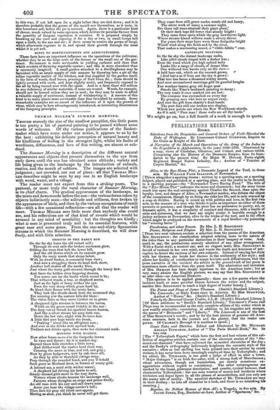THOMAS MILLER'S SUMMER MORNING.
Tworow scarcely the size of the smallest pamphlet, this little poem is too pretty a bit of pastoral painting to be passed without some words of welcome. Of the various publications of the Basket- Maker which have come under our notice, it appears to us by far the best : exhibiting his delicate perception of natural beauty and his kindliness of feeling in the strongest light, whilst his faults of wordiness, diffuseness, and love of fine writing, are absent or sub- dued.
The Summer Morning is a description of the different natural appearances and objects that present themselves to the eye from early dawn until the sun has obtained some altitude ; variety and life being given to the landscape by the introduction of animals, rustics, and the march of soldiers. The images are selected with judgment ; not crowded, not out of place : all that THOMAS MIL- LER describes might be seen by any one in an English landscape with wood, water, and a village. The reader must not expect from this a striking poem. The pastoral, or more truly the rural character of Summer Morning, as its chief charm. The gradual appearances of the landscape, as the mists and dewsrecede before the sun—the various forms taken by objects indistinctly seen—the solitude and stillness, first broken by the,appearance of birds, and then by the various occupations cif rustic life—with tt few occasional reflections—are all that the reader will meet. Twomas MILLER sees little more than anybody else could see, and his reflections are of that kind of reverie which would be aroused in any mind of sensibility : but the thoughts are kindly ; what is seen is presented truly and in its essential features, with great ease and some grace. From the one-and-thirty Spenserian stanzas.in which the Summer Morning is described, we will draw freely, and with little selection.
OBJECTS IN THE EARLY SUN.
On the far sky leans the old ruined mill; Through its rent sails the broken sunbeams glow, Gilding the trees that belt the lower hill, And the old thorns which on its summit grow.
-Oily the reedy marsh that sleeps below,
With-its dwarf bushes, i8 concealed from view;
And now a struggling thorn its head doth show, Another half shakes off the smoky blue, Just where the dusty gold streams through the heavy dew.
And there the hidden river lingering dreams, You scarce can see the banks which round it lie; That withered trunk, a tree, or shepherd seems, Just as the light or fancy strikes the eye. Even the very sheep which graze hard by, So blend their fleeces with the misty haze, They look like clouds shook from the unsunned sky, Ere morning o'er the eastern hills did blaze: The vision fades as they move further on to graze.
A cheonered light streams in between the leaves, Which on the green-sward twinkle in the sun: The deep. voiced thrash his speckled bosom heaves, And like a silver stream his song doth run, Down the low vale, edged with fir-trees dun. A little bird now hops beside the brook, Peaking" about like an affrighted nun ; And ever as she drinks doth upward look,
Twitters and drinks again, then seeks her cloistered nook.
MORNING WITH RI7STIC5.
Now other forms move o'er the footpaths brown In twos and threes ; for it is market-day.
Beyond those hills stretches a little town,
And thitherward the rustics bend their way, Crossing the scene in blue, and red, and gray ;
Now by green hedgerows, now by oak-trees old,
As they by stile or thatched cottage stray. Peep through the rounded hand, and you '11 behold Such gems as Morland drew, in frames of sunny gold.
A ladened ass, .a maid with wicker mann',
A shepherd lad driving his lambs to sell, Gaudy-dressed girls move in the rosy dawn, Women whose cloaks become the landscape well, Farmers whose thoughts on crops and prizes dwell; An old man with his cow and calf draws near.
Anon you hear the village-carrier's bell;
Then does his gray old tilted cart appear, Moving so alow, you think he never will get there.
They come from still green nooks, woods old and hoary, The silent work of many a summer night, Ere those tall trees attained their giant glory,' Or their dark tope did tower that eloudy height :
They come from spots which the gray hawthorns light, Where stream-kissed willows made a silvery shiver.
Foryears their steps have worn those footpaths bright Which wind along the fields and by the river,
That makes a murmuring sound, a "rile-bibble " ever.
LANDSCAPE FEATURES.
In the far sky the distant landscape melts, Like piled clouds tinged with a darker hue; Even the wood which you high upland belts
Looks likes range of clouds, of deeper blue.
One withered tree bursts only on the view— A bald bare oak, which on the summit grows,
(And looks as if from out the sky it grew) : That tree has borne a thousand wintry snows, And seen unnumbered mornings gild its gnarled boughs. Yon weather-beaten gray old finger-post
Stands like Time's landmark pointing to decay ; The very roads it once marked out are lost : The common was encroached on every day By grasping men who bore an unjust sway,
And rent the gift from charity's dead hands.
The post does still one broken arm display,
Which now points out where the New Workhouse stands, As if it said, "Poor man ! those walls are all thy lands."
We might go on, but a full fourth of a work is enough to quote. •


























 Previous page
Previous page